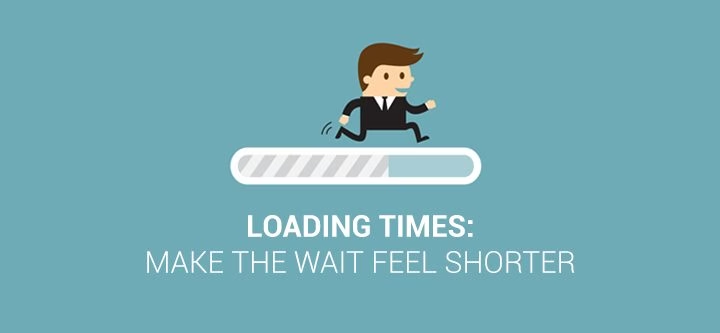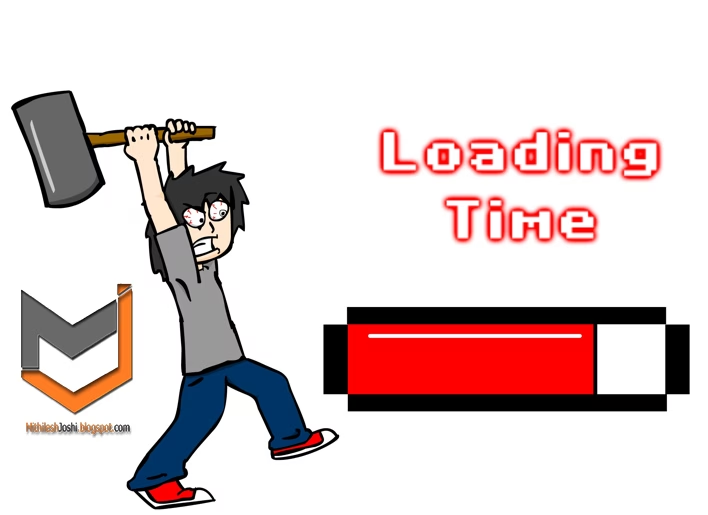
Guarantee Fast Loading Times for Your Website and App
How do you guarantee fast loading times for your website and apps? Help is at hand! Read this guide to help you ensure that your website and app load quickly and succeed in the market.
Below I am going to explain why fast loading times matter for mobile and web apps and websites as well as to provide some tips on how to improve your page load time.
In this article
- Why a Fast Loading Time of Your Website Matters
- The Importance of Fast Loading Time of Your Mobile App
- How to Improve the Loading Time of Your Website or a Web App?
- Improving the Loading Time of Your Mobile App: How Do You Achieve This?
- Frequently Asked Questions on fast loading times
Why is it essential that you keep a hawk eye on how fast your website and apps load? Well, as I have already explained in “How to Find the Best Software Code Reviewers”, the performance of your website or app directly influences its success.
Websites and apps that perform well in the market — load fast. This allows them to deliver an excellent user experience (UX). On the other hand, slow loading times lead users to abandon apps. If this happens, then your software development project has failed.
Why a Fast Loading Time of Your Website Matters

Modern life is fast, isn’t it? In keeping with it, Internet users want websites they visit to load fast, too! The loading time of a website is a key consideration in their overall UX, therefore, fast websites lead to more conversions.
Do you think that fast websites impress only Internet users? Well, think again! Search engines pay close attention to how fast websites load, and this forms a key yardstick when they rank sites.
Google, for e.g., is increasingly considering fast loading as a key factor to rank websites. Read more about this in “How fast should a website load?”.
The Importance of Fast Loading Time of Your Mobile App
Are you planning to launch a mobile app for your business? Why wouldn’t you? Mobile apps are increasingly popular and mobile users are spending more time on apps than mobile websites.
That’s great, however, remember that the market for mobile apps is highly competitive. You need to attract users and retain them, and UX matters a great deal. Once again, the loading time of a mobile app has a great influence on the UX.
There are 3 kinds of start for a mobile app, and these are as follows:
- Cold start: This refers to an app starting from scratch, and the mobile operating system (OS) creates the process of this app for the first time. This involves the maximum amount of overhead.
- Hot start: This kind of start involves lower overhead since the app was started earlier. The mobile OS brings your activity on the app to the foreground.
- Warm start: This includes some operations that are part of the cold start process, although it’s not exactly a cold start. It certainly involves more overheads than a hot start. An example is when a user backed out from an app, subsequently, he/she relaunches it.
Want your mobile app to deliver a great UX? Work on delivering fast loading time for all of the above kinds of starts. Read more about this in “App startup time”.
How to Improve the Loading Time of Your Website or a Web App?
Now that you know why fast loading of websites and web apps matters, how do you improve their loading time? This involves the following steps:
1. Decide a target loading time based on the industry's vertical
Do we have an absolute benchmark of how fast a website or web app should load? The truth is that there’s no such absolute threshold, and the industry you are operating in plays a big part here.
Take the example of an eCommerce website or web app. Such websites display product catalogs, therefore, they load plenty of high-definition images. On the other hand, a website or web app offering financial products and services wouldn’t necessarily load so many images.
Naturally, eCommerce websites or web apps might take slightly longer to load than sites or apps offering financial products or services. You need to decide on a target that fits your industry, subsequently, you should plan on outperforming your competitors.
Remember that many Internet users view websites on their mobile phones, therefore, you should focus on fast page loading on mobile. Read more about this in “Find out how you stack up to new industry benchmarks for mobile page speed”. Take a look at the new industry benchmarks for mobile page speed.

2. Make the right architectural decisions
You would rather plan for fast loading time from the very beginning of your project, wouldn’t you? Choosing the architectural pattern for your web app is the stage when you make key decisions for the first time. Get these decisions right by choosing the right architectural pattern.
As I have explained in our guide “Large Enterprise Java Projects Architecture”, there are several popular architectural patterns, e.g.:
- Layered (n-tier) architecture;
- Event-driven architecture;
- Microkernel architecture;
- Microservices architecture;
- Space-based architecture.
Make an informed decision about the pattern you choose. E.g., microservices architecture is popular, however, it’s not a magic pill!
If you offer various services in your web app and you can clearly separate them from each other, then this architectural pattern makes sense for you. Otherwise, it will add to the complexity, as I have explained in “10 Best Practices for Building a Microservice Architecture”.
3. Choose the right hosting and “Content Delivery Network” (CDN) solutions
You are likely planning to take advantage of cloud computing when developing your app, and why wouldn’t you? “Managed Cloud Services Providers” (MCSPs) let you focus on development instead of IT infrastructure management, moreover, they can help you to keep your infrastructure costs down.
Your choice of the right cloud hosting solution significantly influences how fast your website or web app will load. You would want to buy services from a “Managed Cloud Services Provider” (MCSP) that has impressive cloud capability, and I recommend AWS.
The good news is that AWS offers a powerful “Platform-as-a-Service” (PaaS) platform, which is commonly known as AWS Elastic Beanstalk. This PaaS platform manages the cloud infrastructure, networking, operating system, middleware, and runtime environment, therefore, you can concentrate on developing your web app.
You want your content to load fast, don’t you? This requires you to use a powerful “Content Delivery Network” (CDN) service, which ensures low latency. AWS has a powerful CDN too, which is known as “Amazon CloudFront”. I recommend that you use it.
4. Use a technology stack that facilitates fast loading time
Which technology stack should you use to facilitate fast loading time for your website or web app? This question requires careful analysis since you aren’t only planning for today, rather you need to think of the long term too.
What happens when you grow your user base and process a lot more transactions in the future? Your website or web app should load fast at that time too, therefore, you need to design for scalability in addition to performance.
Your choice of the technology stack should ensure both performance and scalability. I recommend that you use Node.js, which is a very popular open-source runtime environment.
It enables you to create performant and scalable web apps. You can experience high productivity since there is a large collection of excellent open-source tools and frameworks. Read our guide “10 great tools for Node.Js software development” to learn more about it.
You probably plan to develop APIs to enable your front end to access the backend using a consistent framework, don’t you? I assume that you are planning to develop RESTful APIs since REST (Representational State Transfer) is the de-facto standard for API development now.
Which database solutions should you use when developing APIs so that you can offer both performance and scalability? I recommend the following:
- PostgreSQL, which is a performant and scalable open-source RDBMS (Relational Database Management System);
- MongoDB, which is an open-source NoSQL document database that’s known for its performance and scalability.
I have earlier explained the value of using these database solutions while developing APIs, and you can read “How to build RESTful API for your mobile app?” for more information.
5. Keep performance in mind while coding
Good coding practices matter, don’t they? It’s true for coding performant websites or web apps, too! Your development team needs to follow the appropriate development best practices to ensure fast loading time, e.g., they need to use caching intelligently.
How would you ensure that your programmers use sound coding practices? Well, code review plays an important part here. Experienced code reviewers can find out whether your code will deliver the expected functionalities, moreover, they also unearth potential issues that might adversely impact performance and scalability.
How do you find competent code reviewers, though? We at DevTeam.Space have just the right expertise you need.
Note: You can use tools like Google PageSpeed Insights or GTmetrix to check how fast your website loads.
Improving the Loading Time of Your Mobile App: How Do You Achieve This?
Offering a mobile app? In that case, we now need to turn our attention towards improving the loading time of your planned mobile app.
You will find that there are several common aspects when you try to improve the loading time of your website/web app and your mobile app. The commonalities are the following:
- You need to make the right architectural decisions in both cases.
- In both cases, you need to find a “Managed Cloud Services Provider” (MCSP) that can help you to make your app load fast.
- You will develop APIs for both web and mobile apps, therefore, you need to choose performant and scalable database solutions.
- Coding best practices play an important part in ensuring fast loading for the web as well as mobile apps.
You will notice slightly different flavors though, e.g., I would recommend that you use a “Mobile-Backend-as-a-Service” (MBaaS) platform when you develop a mobile app. Here again, I recommend that you stick to AWS and use AWS Amplify, i.e., its MBaaS platform.
So, what do you do differently to improve the loading time of your mobile app? The answer lies in deciding what kind of app you will develop and what technologies you use. Do the following:
1. Develop native mobile apps and not hybrid apps
You might have come across many discussions about developing hybrid mobile apps, haven’t you? Programmers develop hybrid mobile apps once and they use it on both Android and iOS. This keeps the development costs down, moreover, one codebase keeps the maintenance costs down.
Should you take this approach and develop hybrid mobile apps? I don’t recommend that.
It’s true that we now have excellent hybrid development frameworks like React Native, and they deliver a near-native user experience. However, they still fall short of native Android and iOS apps.
Native Android and iOS apps use technologies that make the best possible use of the respective operating systems, therefore, they deliver the best performance. Your chances of coding mobile apps that have fast loading times improve significantly when you develop native apps.
Read “Native app development vs. hybrid app development” for more insights.
2. Choose the right programming languages
Now that you are clear about the advantages of native mobile app development, which technologies should you use? I recommend the following:
Kotlin for native Android development
Android developers can choose between Java and Kotlin. Java hardly needs an introduction, and Kotlin is a modern language that’s gaining popularity quickly.
While both are robust choices for native Android development, Kotlin has an advantage since it causes no runtime overhead. The Kotlin library is small, which reduces overheads, as I have explained in “Kotlin vs Java: Which is the best choice?”.
Swift for native iOS development
Native iOS developers can code using Objective-C, which has been the mainstay of iOS development for a long. They can also code using Swift, a modern language for iOS development that has gained massive popularity in recent years.
Swift is lightweight, and Apple estimates that apps coded in Swift run faster than those coded in Objective-C. I recommend that you use Swift, and I have explained its advantages in “How to migrate your Objective-C project to Swift?”.
Wondering How to Guarantee Fast Loading Time for Your Website and Apps?
As you have seen by now, guaranteeing fast loading time for your website and apps requires thorough preparation, moreover, you need to choose the right technology stack. You need to follow the appropriate coding best practices, too.
Engage a competent software development company for such an endeavor, and read our guide “How to find the best software development company?” to find one.
If you are still looking for a trustworthy development partner, send us your initial project specifications via this quick form. One of our expert account managers at DevTeam.Space will get in touch with you soon.
Further Reading
Here are a few articles that might also interest you:
10 Examples Of Successful Minimum Viable Products - DevTeam.Space
10 Best Influencer Marketing Platforms to Find Influencers
Frequently Asked Questions on fast loading times
Do the following to guarantee fast loading times for your website and app:
Set a realistic target load time and plan the architecture accordingly.
Choose the right “Managed Cloud Services Platform” (MSCP) and “Content Delivery Network” (CDN).
Select the right technology stack including programming language, development framework, and databases.
Follow the coding best practices to develop performant websites and apps.
Users don’t want to wait too long for websites and apps to load. They might abandon slow websites and apps, and they might look for competitors’ websites and apps.
Some websites and apps are slower than others due to one or more of the following reasons:
Sub-optimal hosting and infrastructure;
Obsolete and sub-optimal technology stack;
Too many requests to the server;
The app or website is overcrowded with data;
Coding issues like the lack of caching, sub-optimal code, etc.


